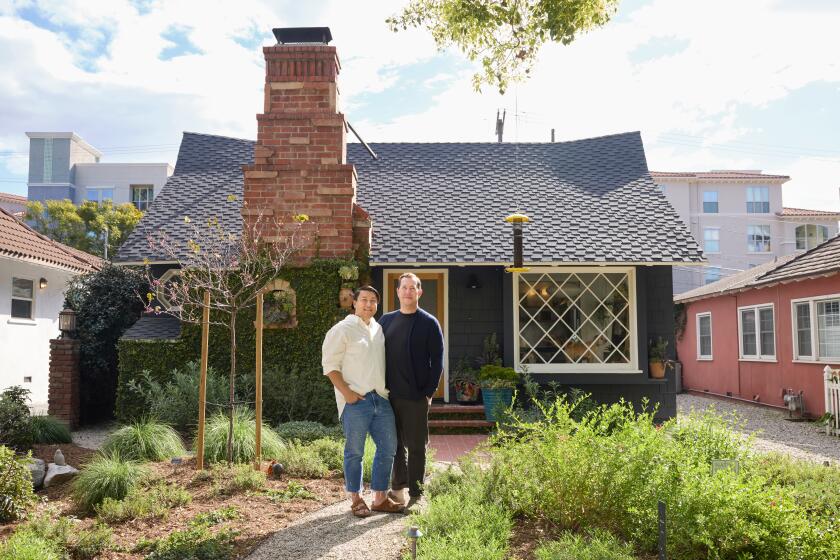Gardener Gets Offers of Money, Land, Encouragement
Support blossomed Thursday for a woman who faces a city order to uproot a garden she created in an unused alley without a permit.
Responding to a news story in The Times, many people around Los Angeles called to offer the gardener, Victoria O’Casey money, landscape work, encouragement or another plot of land.
One of the callers proposed that O’Casey move to an overgrown quarter-acre plot at Patrick Henry Middle School in Granada Hills formerly used as an agricultural study area. Since school district cutbacks eliminated that program years ago, the Devonshire Street lot has occasionally been used to sell fresh vegetables and Christmas trees.
“We’ve been looking for someone who loves to garden and would be willing to let the kids help them,” said Jeff A. Fox, president of the parents’ organization at the school. “We’re offering free land and free labor. The kids are dying for hands-on education like this.”
Additionally, a Kagel Canyon landowner offered to let her garden a quarter-acre he owns at the edge of Angeles National Forest. An Atwater Village landscape designer offered her work. And an administrator at a private Pasadena elementary school offered money and a pat on the back.
O’Casey found the outpouring of concern overwhelming.
“I thank the people who called offering me support or a piece of land, but it’s really not necessary as long as the city lets me keep my garden,” she said.
Here’s the problem: O’Casey began building the elaborate garden at the end of an unpaved dead-end alley five years ago. She had rented a house whose back-yard garden abutted it, and coveted the extra space--which she said was then littered with rotting timber, weeds and broken glass.
She says she asked a city worker one day for permission, and he told her to go ahead.
Subsequently, she built a 60-foot-long miniature arboretum in the 20-foot-wide space. She used an existing shed for bromeliads that need shade, grew vines and nasturtiums on a hill, created a rose garden in the center and a cozy, dirt-floored entryway. Along the sides are fruit trees and unusual grasses. She installed a fence to bar vandals.
O’Casey, a native of Ireland, had trouble finding work as a artist and spent up to 40 hours a week there, gardening and sketching. She became a presence that apparently made her unpopular with at least one neighbor.
That neighbor confidentially complained to the city Department of Public Works that O’Casey played classical music too loud, often awoke her at 6 a.m. with the sound of raking and erected “shacks” in the garden that ruined her view.
Acting on that complaint a few weeks ago, the department’s Bureau of Street Maintenance sent O’Casey an official “Notice to Abate Nuisance.”
To comply, O’Casey tore down one shed that she says she used for sketching, removed a gate and applied for a permit to use the city-owned property.
Her application was rejected, according to a city engineer, because she does not own land directly adjacent to the alley and therefore has no direct rights to it. She moved several years ago to a rented house nearby.
An official at the office of her local councilman, Hal Bernson, on Thursday offered O’Casey assistance in filing an appeal of the abatement notice.
“No one is coming out with a bulldozer. If she can’t get a permit, maybe we can help her move it to a plot somewhere else in the city,” said Francine Oschin, the Bernson deputy.
Alley gardens are, in fact, encouraged by the city.
J.P. Ellman, president of the Los Angeles Board of Public Works, said her department’s Alley Conversion Program provides a framework for neighborhoods and garden clubs to turn overgrown alleys into gardens. While contending that Public Works inspectors sent the original citation following three neighbors’ complaints, Ellman said she still wants to find a compromise.
“It looks like she has a beautiful garden, but we have an obligation to protect everyone’s rights,” said Ellman. “If it wasn’t created legally, we will try to make adjustments to make it work.”



